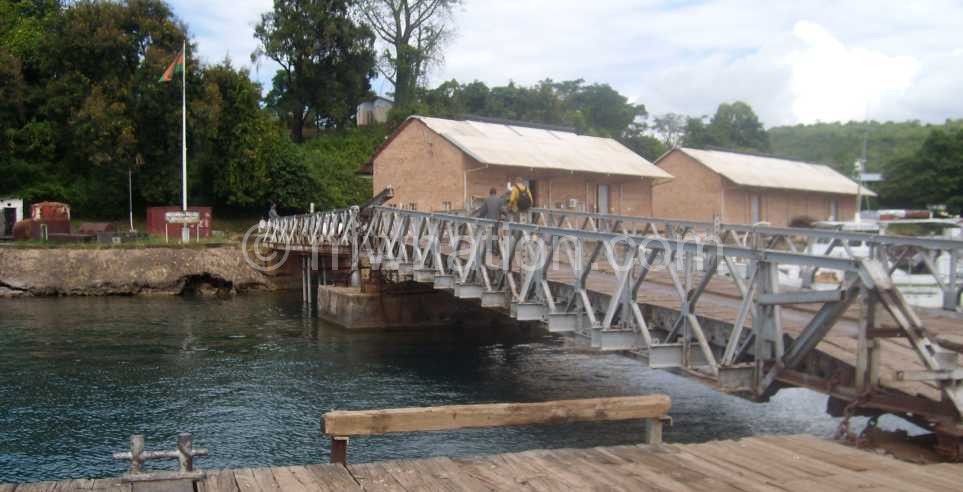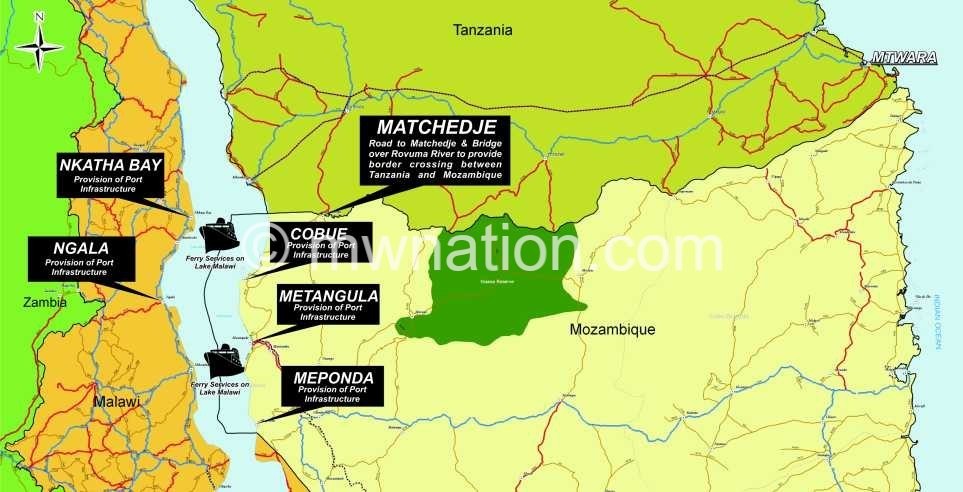Mtwara Development Corridor faces hiccups
A cold war has ensued between two government departments over a piece of land which is reserved for the expansion of Nkhata Bay Port in readiness for the regional Mtwara Development Corridor, Our Reporter JOHN CHIRWA investigates.
A stone’s-throw away from the shores of Lake Malawi at Nkhata Bay Port, stands a gigantic one-storey building. It is the official residence for Lakeside Manda, a business tycoon in the district. He owns several other buildings, dotted along the shoreline, for commercial purposes.

Apparently, Manda is accused of illegally developing the area because “all land along the shore at Nkhata Bay Port is gazzetted as public land by an Act of Parliament”.
According to the Inland Waters Shipping Act of 1995, private development in the harbour area may be entertained only to those whose activities are directly in line with waterfront harbour activities; after their activities have been assessed and valuated by the Marine Department.
The department has since written the Nkhata Bay District Council, expressing concern on the purported illegal development taking place within the harbour area.
“I have noted with great concern about the encroachment that is taking place within the harbour area, depriving the port room for future development. The harbour area is heavily encroached, and that the Council continues to allocate land for private development within the harbour area; contrary to the provisions of the Inland Waters Shipping Act of 1995.
“Currently, the harbour is so much squeezed, causing restrictions on the activities and operations of the port. It is in the interest of the Ministry of Transport and Public Works through this department to see water transport flourish with significant economic contribution to the people of Nkhata Bay as well as the whole nation. In view of the above, I wish to ask for your intervention in the matter and I should be very grateful for your prompt action,” reads the letter dated January 2, 2018.

But Manda argues that he has not contravened any law by constructing residential and commercial buildings within the harbour area.
“I acquired this land from the district council some 50 years ago and I have title deeds from Lands Department to prove my point,” he says.
Manda is surprised that government is raising the issue now when they have settled in the area for about five decades.
“These are plots. We were given as plots. We didn’t just come to develop the area. It was with the blessing of the council,” he says.
Manda first settled in the district in 1968. He then went to Zambia for greener pastures and came back in 1975 for permanent settlement.
“If I had known that this will happen, I shouldn’t have settled in Malawi. Imagine, we were given this land by government over 50 years ago, and the same government comes now to say we have encroached its land. Where does that happen?
“It is disturbing because we have papers to show that we are legitimate owners. So, how does that amount to encroachment?” he queries.
Senior assistant surveyor of vessels (Marine – North) Chikosa Mkandawire says, according their records, about 100 households have encroached the port on a perimeter of 1 201 metres.
He says apart from contravening the Inland Waters Shipping Act of 1995, the households have also flouted the Lands Acquisition Amendment Act (2017) which designates land from the water body up to a distance of 100 metres as public land.
“The laws also say 30 metres of land from the road should not be developed, but here people have title deeds for land even just eight metres from the road leading to the main entrance of the port,” he says.
Mkandawire says only two structures are allowed within the harbour area at Nkhata Bay Port and these are the old Import and Export Company (Chipiku) and Admarc whose activities are in line with port activities like shipping food cargo to Likoma Island and other lakeside hard-to-reach areas.
He says the encroachment therefore will affect the expansion of the port in readiness for the Mtwara Development Corridor which seeks to enhance regional integration.
“The tricky part of it is that displaced families will demand compensation since they have titled deeds. But compensations wouldn’t be given because the laws clearly stipulate that this is public land,” he says.
The Mtwara Development Corridor, once fully developed, will link Malawi to the port of Mtwara in Tanzania on the Indian Ocean through Mbamba Bay and Nkhata Bay ports on the eastern and western shores of Lake Malawi, respectively.
The corridor seeks to serve as an export/import route for Malawi and neighbouring countries whilst at the same time promoting regional trade and integration among member countries.
The Mtwara Corridor is believed to be a better and shorter route for transportation of goods than the Dar es Salaam route for Malawi, Zambia and the Democratic Republic of Congo (DRC).
Acting director of marine Captain John Mhango says the only part remaining on the Malawian side is the expansion of the port in Nkhata Bay after completing the Mzuzu-Nkhata Bay Road which is also part of the corridor.
“Our colleagues in Tanzania are still working on the road to Mbamba Bay. They are remaining with 67 kilometres stretch of a road. After that, we will be looking at the ports on the two sides. But our challenge will be on reclaiming the encroached land,” he says.
Mhango says the Mtwara project is important because “there will be development along the corridor” and would shorten the distance from Tanzania to Malawi by 400km.
“Now, we will be talking of a route which is not very busy. It will be dedicated to serving Malawi and Zambia, and some countries around,” he says.
Nkhata Bay district commissioner (DC) Rodney Simwaka confirms that there are cases where land documents are given to individual applicants on land which is already owned by government.
“We regard the encroachment in the harbour area as a concern. We will be engaging residents and those who have encroached the land on how best we can address this issue. There is also need for coordination between this office and our colleagues in the lands department. We really need to work together,” he said.
Ministry of Lands, Housing and Urban Development public relations officer John Chikwemba admits that a big chunk of land at the coast of Lake Malawi in Nkhata Bay was designed for a harbour some decades ago.
He, however, says according to some documents, the land use was revised and includes other developments within the harbour site.
“You may wish to know that the leases retrieved date back to 1953. Later in 1999, the layout plan was revised as per the plan dated 22nd June 1999. Revision on a layout plan is done upon consultation with different stakeholders and when there are no reservations from anyone of the concerned stakeholders it is approved. In around 2010, the Urban Structure Plan was revised and changed some land uses on the area,” he said.
Chikwemba said when a government institution is allocated a piece of land, it is their responsibility to see to it that no one encroaches onto it.
“In the case of Nkhata Bay, all developments may not be considered to be illegal as a due process was done for those with title deeds. If due process was not done, it could not be possible to process their title deeds for private individuals,” he said.
But as they say, when two elephants fight, it is the grass that suffers. The cold war between the two departments will surely affect plans to expand the port in readiness for a regional project that seeks to enhance integration. And it is the common Malawian who will ultimately suffer.





